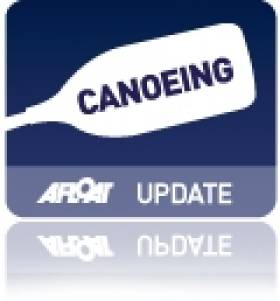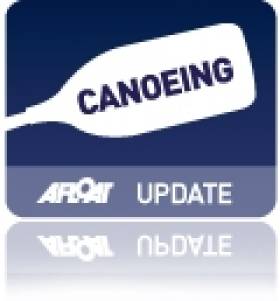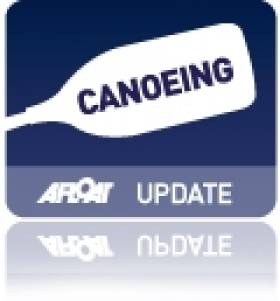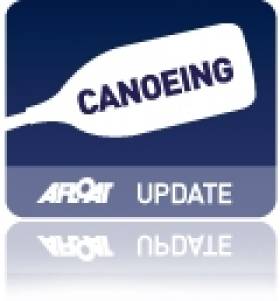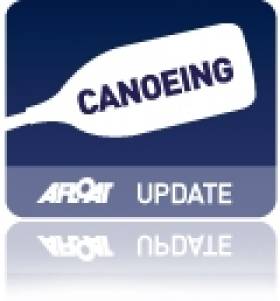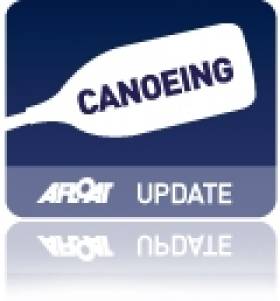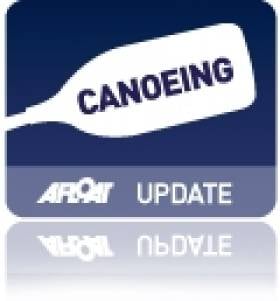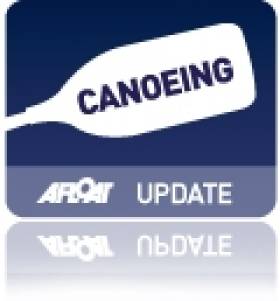Displaying items by tag: Jezierski
Jezierski and Jenny Egan To Compete in B Finals in Baku
#CANOEING: Ireland’s Andrzej Jezierski qualified for the B Final (places 10 to 18) of the men’s C1 200 metres at the European Games in Baku, Azerbaijan today. Jezierski finished sixth in his heat but improved to fifth in his semi-final. Jenny Egan will compete in the B Final of the K1 500, having qualified on Sunday. She made the semi-finals in the K1 200m but her eighth-placing there means she did not make it through to the A or B final. She is also set to compete in the K1 5000m straight final tomorrow.
Peter Egan and Simas Dobrovolskis finished eighth of eight in their heat of the K2 200m and did not qualify for the semi-finals, while Tom Brennan in the K1 200 made it to the semi-finals but finished outside the qualification mark for the A and B Finals.
European Games 2015, Baku, Azerbaijan
Canoe Sprint (Irish interest)
Men
K2 200 – Heat One: 8 P Egan, S Dobrovolskis 35:049.
K1 200 – Heat Two: 6 T Brennan 35.446. Semi-Final: 8 Brennan 36.191.
C1 200 – Heat One: 6 A Jezierski 42.339 seconds. Semi-Final One: 5 Jezierski 40.277
Women
K1 200 – Heat Three: 6 J Egan 42.843. Semi-Final Two: 8 J Egan 42.657.
K1 500 – Heat One: 6 J Egan 1:55.468. Semi-Final: 7 J Egan 1:52.536.
#CANOEING: Andrzej Jezierski and Jenny Egan both finished seventh in 200m heats and must get through semi-finals if they are to reach the final at the European Canoe Sprint Championships in Racice in the Czech Republic. Both Jezierski and Egan must finish in the top three in the afternoon semi-final to make the A Final. Places four to seven would qualify them for the B Finals.
European Canoe Sprint Championships, Racice, Czech Republic (Selected Results; Irish interest)
Men
C1 200 - Heat Three (Winner to Final; second to seventh to semi-final): 1 Portugal (H Silva) 39.236; 7 A Jezierski 43.220
Women
K1 200 – Heat Three (Winner to Final; second to seventh to semi-final): 1 Serbia (N Moldovan) 40.236; 7 J Egan 43.384.
Jezierski Eighth in B Final at Canoe Sprint World Championships
#CANOEING: Andrzej Jezierski finished eighth of nine in his B Final of the men’s C1 200 metres at the Canoe Sprint World Championships in Moscow today. It placed him 17th in the world. On Saturday, Michael Fitzsimons and Barry Watkins won their C Final to finish 19th overall in the men’s K2 1,000 metres, which is also an Olympic discipline.
Canoe Sprint World Championships, Day Four (Irish interest, selected results)
Men
K2 1,000m – C Final (Places 19 to 27): 1 M Fitzsimons, B Watkins 3:15.327.
K2 200m – Semi-Final: 7 P Egan, S Dobrovolskis 34.004.
C1 200m – Semi-Final (First Three to A Final; next Three to B Final; rest out): 1 Lithuania 38.320; 6 A Jezierski 39.638.
K1 5,000 – Final: 1 Australia 20 mins 12.981; 21 P Egan 22:52.889.
Women
K1 – B Final (Places 10 to 18): 4 J Burke 3:05.18.
K1 200 – Semi-Final: 8 J Egan 43.097.
K1 5,000 – Final: 1 Britain 23 mins, 10.957 secs; 11 J Egan 24:08.510
Sunday
Men
C1 200 – B Final (Places 10 to 18): 1 Azerbaijan 38.885; 8 A Jezierksi 40.926.
European Canoe Semi-Final Spot for Ireland's Jezierski
#CANOEING: Ireland’s Andrzej Jezierski took fourth place in his heat of the C1 200 metres at the European Canoe Sprint Championships in Brandenburg in Germany today. He will compete in tomorrow’s semi-finals.
Barry Watkins and Michael Fitzsimons competed in the semi-finals of the K2 1,000 metres. Their fourth-place finish left them just .3 of a second off a final place.
Canoe Sprint European Championships (Selected Results; Irish interest)
Men,
K2 1,000 metres: Heat One: 5 M Fitzsimons, B Watkins 3:17.038. Semi-Final: 4 Fitzsimons/Watkins 3:19.812.
C1 200 metres – Heat One: 4 A Jezierski 41.598 seconds.
Jezierski Misses Chance By Trying Too Hard to Start Fast
#CANOE SPRINT: Andrzej Jezierski’s challenge in the semi-finals of the Canoe Sprint World Cup in Szeged, Hungary ended before it began. The Ireland competitor first had a false start and then, straining to get an edge second time around, he fell in just before the race was due to begin. He was disqualified and the race went off without him. Jenny Egan finished ninth in the women’s K1 200 metres semi-final and Peter Egan and Simas Dobrovolskis filled the same position in the K2 200m semi-final.
Canoe Sprint World Cup, Szeged, Hungary (Irish interest)
Men
C1 200m – Heat One: 1 Russia (A Korovashkov) 41.746, 2 Kazakhstan (M Medetov) 43.888, 3 Ireland (A Jezierski) 43:978. Semi-Final One: Jezierski disqualified.
K1 500m – Heat One: 6 B Watkins. Semi-Final Three: 3 Watkins.
K1 1,000m – Heat Four: 7 B Watkins. Semi-Final Two: 8 Watkins.
K2 200m – Heat Four: 6 P Egan, S Dobrovolskis.
Women
K1 200 – Heat One: 7 J Egan. Semi-Final: 9 Egan.
K1 500 – Heat One: 7 J Egan. Heat Two: 7 J Burke. Semi-Final Two: 8 Burke. Semi-Final Four: 9 Egan.
K1 1,000 – Heat One: 4 J Burke.
Jezierski Sprints Into World Cup Semi-Final
#CANOEING: A fast finish in his heat put Andrzej Jezierski into the semi-finals of the C1 200 metres at the Canoe Sprint World Cup in Szeged in Hungary today. Jezierski finished third in a heat which was won convincingly by Alexey Korovashkov of Russia.
Jenny Egan in the K1 200 metres and Peter Egan and Simas Dobrovolskis in the K2 200m also qualified for semi-finals.
Barry Watkins finished third in his semi-final of the K1 500 metres and qualified for the B Final.
Canoe Sprint World Cup, Szeged, Hungary (Irish interest)
Men
C1 200m – Heat One: 1 Russia (A Korovashkov) 41.746, 2 Kazakhstan (M Medetov) 43.888, 3 Ireland (A Jezierski) 43:978.
K1 500m – Heat One: 6 B Watkins. Semi-Final Three: 3 Watkins.
K1 1,000m – Heat Four: 7 B Watkins. Semi-Final Two: 8 Watkins.
K2 200m – Heat Four: 6 P Egan, S Dobrovolskis.
Women
K1 200 – Heat One: 7 J Egan
K1 500 – Heat One: 7 J Egan. Heat Two: 7 J Burke. Semi-Final Two: 8 Burke. Semi-Final Four: 9 Egan.
K1 1,000 – Heat One: 4 J Burke.
Jezierski Competitive in European Canoe Sprint A Final
# EURO CANOE SPRINT: Ireland’s Andrzej Jezierski finished sixth in the A Final of the C1 (Canadian Canoe) 200 metres at the European Canoe Sprint Championships in Portugal. The Polish-born athlete was among the leaders early on, but was reeled in during the middle stages of the race, which was won by Jevgeni Shuklin of Lithuania. Jezierski was .955 of a second behind.
Earlier, Barry Watkins finished seventh in the men’s K1 (racing kayak) 500 metres. Watkins had also reached the A Final of the K1 1000m, where he finished eighth. Pat O’Leary, Ireland’s first paracanoeist to take part in an international championships, also made the A Final of the men’s K1 200m, finishing ninth.
Jenny Egan finished fifth in the women's K1 5,000 metres.
European Canoe Sprint and Paracanoe Championships (Irish interest; selected results)
Saturday
Men
K1 1000m – A Final: 8 B Watkins 3:33.420.
C1 200m – Heat One: 2 A Jezierski 41.594.
Paracanoe – K1 200m - A Final: 9 P O'Leary.
Women
K1 200m – Heat One: 9 J Egan 47.429
Sunday
Men
K1 500m – A Final: 7 B Watkins 1:44.421
C1 200m – A Final: 6 A Jezierski 42.631 seconds
Women
K1 5000 - Final: 5 J Egan 23:13.753
# EURO CANOE SPRINT: On his first outing at the European Canoe Sprint Championships in Portugal, Ireland’s Andrzej Jezierski finished second in his heat of the C1 200, just eight hundredths of a second off the top spot. Jezierski goes directly through to tomorrow's A Final.
Barry Watkins finished eighth in the A Final of the K1 1000.
European Canoe Sprint Championships (Irish interest)
Men
K1 1000 – A Final: 8 B Watkins 3:33.420.
C1 200 – Heat One: 2 A Jezierski 41.594
Women
K1 200 – Heat One: J Egan 47.429



























